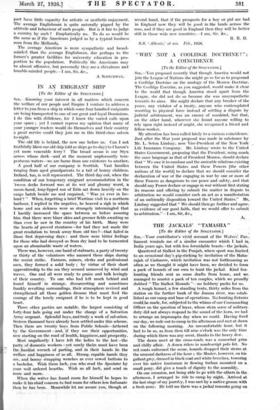IN AN EMIGRANT SHIP [To the Editor of the SPECTATOR.]
Sin,—Knowing your interest in all matters which concern the welfare of our people and Einpire I venture to address a letter to you from a ship in which some four hundred emigrants arc being transported to one of our great and loyal Dominions. I do this with diffidence, for I know the varied calls upon your space; yet I cannot repress my opinion that many of your younger readers would do themselves and their country. a great service could theY join me in this third-class saloon to-night.
The old life is behind, the new one before us. Can I not truthfully liken our old ship (old as ships go to-day) to Charon's yet more venerable ferry ? The broad ocean is our Styx _across whose dark—and at the moment unpleasantly tem- pestuous waters—we are borne from one existence to another.
A good half of our company is Scottish. Vast familiei ranging from aged grandparents to a tail of bonny children. Ireland, too, is well represented. The third day out, when the condition of our...temporary emigrant accommodation in the 'twecn decks forward was at its wet and gloomy worst, -a moon-faced, long-lipped son of Erin sat down heavily on the cargo hatch beside me and enquired, " Was ye ever in Ire- land ? " When, forgetting a brief Wartime visit to a northern harbour, I replied in the negative, he heaved a sigh in which home and sea sickness were so' strangely intermingled that I hastily increased the space between us before assuring him that there were bluer skies and greener fields awaiting us than ever he saw in the country of his birth. Many were the hearts of proved stoutness—for had they not made the great resolution to • break away from old ties ?—that failed in those first depressing days : and there were bitter feelings for those who had decoyed us from dry land to be tormented upon an abominable waste of waters.
There was, however, one band of stalwarts, a party of twenty or thirty of the volunteers who manned these ships during the recent strike. Farmers, miners, clerks and professional men, they formed a solid bOdy ; by- virtue of their short apprenticeship to the sea they seemed unmoved by wind and waves. One and all were ready to praise and talk lovingly of their country. To one who had left much behind' and found himself in strange, disconcerting and sometimes frankly revolting surroundings, their atmosphere revived and strengthened all those golden dreams that must feed the courage of the lonely emigrant if he is to be kept in good heart.
Three other parties are notable, the largest consisting of forty-four lads going out under the charge of a Salvation Army sergeant. Splendid boys, and truly a work of salvation. Sixteen thousand have already been settled under this scheme. Then there are twenty boys from Public Schools—fathered by the Governmentand, if they use their opportunities, now starting on the xoad of health, happiness, and prosperity.
Most ungallantly, I have left the ladies to the last—the party of domestic workers—yet surely theirs must have been the.harast wrench of parting, and in their hands lie the welfare and happiness of us all. Strong, capable hands they are, and bonny strapping wenches as ever sewed buttons to a bachelor. Wish them luck, you who read the Spectator by your well ordered hearths. Wish us all luck, and send us more and more.
When the writer has found -room for himself he hopes to make it his chief concern to find room for others less fortunate than he has been. Meanwhile let me assure you, though at
second hand, that if the prospects-for a boy or girl are bad in England now they will be good in the lands across the seas, and if they are good in England then they will be better still in those wide new countries.—I am, Sir, &e., R. R. B.
S.S. Athenic,' at sea. Feb., 1926.






















































 Previous page
Previous page